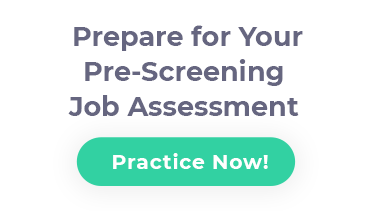UBS Online Assessment, Aptitude Tests, Hiring Process & Interview Preparation [2025]

What Is UBS?
UBS, formally known as UBS Group AG, is the holding company for four subsidiaries that serve as a multinational investment bank and offer a variety of financial services. UBS can be traced back to 1862 Switzerland where their headquarters are still located today in Zurich and Basel. The main areas of business for UBS are:
- Wealth Management
- Private & Corporate Banking
- Investment Banking
- Asset Management
UBS has expanded to over 50 countries employing more than 71,380 people. Their employees enjoy benefits such as:
- Basic Life Insurance
- Dental + Vision Plan
- Paid Parental Leave
- Retirement Plan
These are few of the many employee benefits offered by UBS. They are keen on diversity and try to foster an environment of growth for their employees whether it be personally or professionally.
What Is UBS’s Hiring Process?
UBS’s hiring process has multiple stages to ensure that both the company and applicant are the right fit for one another. The following is a common outline for the hiring process at UBS.
Initial Screening
UBS has a team of employees reviewing applications and CVs. Submitting an application and CV through their job portal on their website will serve as your initial screening. Along with qualifications, work experience and education, be sure to include any relevant achievements to distinguish yourself from other candidates.
Interview Process
UBS’s interview process varies depending on your role and the location of the position. The process usually follows a three-step outline such as:
- Online Assessments
- Technical Interview
- HR Interview
However, some candidates are shortlisted and proceed straight to the HR interview. This is rare and usually only occurs if the candidate knows someone at UBS or if the candidate has tremendous qualifications and was sought out by someone at UBS.
What Are UBS’s Online Assessments?
UBS’s online assessments are an objective measure of the candidate’s behavior and aptitude. Online assessments are provided to all candidates, but the content and quantity of the assessments will vary depending on the role and location you have applied for. You will be given one or all of the following assessments after your application has been reviewed.
- Numerical Reasoning Test
UBS’s numerical reasoning test analyzes the candidate’s ability to interpret graphs, crunch numbers, and perform basic mathematical functions in a hypothetical business scenario. The assessment is multiple choice and each question is timed. In total, the time limit is usually around 20 minutes.
- Logical Reasoning Test
UBS administers the logical reasoning test to evaluate the inductive and deductive reasoning skills of the candidate. The format of the assessment provides the applicant with a series of shapes and objects and asks them to identify the patterns. The test is multiple choice with a time constraint on each question. Practice this assessment as much as you can, the puzzles become very confusing as you progress through the test.
- Verbal Reasoning Test
UBS’s verbal reasoning test explores the candidate’s capability to discern between facts and inferences. The verbal reasoning test loosely follows the guidelines of a case study in the sense that you need to prioritize main ideas and narrow your focus solely to the topic at hand. The format will provide you with a paragraph of information followed by a few statements which you will mark true, false, or cannot say. Don’t worry if the subject matter of the passage is foreign to you, prior knowledge of the material is not necessary. The answers will be right in front of you.
- Situational Judgement Test (SJT)
UBS’s situational judgement test – UBS calls it a Cultural Appraiser – evaluates the personality and behavioral preferences of the candidate. The test will provide hypothetical situations that one might encounter in the workplace and ask you to choose how you would respond from a list of choices. Below, in the students and graduates’ section, you will find the ‘three keys of UBS’, become well acquainted with them as this is what UBS favors in their employees. UBS will have countless questions on their SJT that subtly prods at these characteristics.
- UBS Culture Match Assessment
The UBS Culture Match Assessment stands out in the financial industry as a cutting-edge tool integral to UBS’s recruitment strategy. This unique assessment aligns candidates’ values and work styles with UBS’s distinctive corporate culture, ensuring a harmonious fit. It is a key component in maintaining UBS’s reputation as a top-tier employer in the dynamic finance sector. The assessment’s advanced algorithm evaluates personal and professional attributes, offering insights into how well applicants resonate with UBS’s ethos. This not only streamlines UBS’s talent acquisition but also aids candidates in understanding the firm’s values. Emphasizing cultural compatibility, UBS reinforces its commitment to diversity and inclusion, crucial for fostering innovation. The UBS Culture Match Assessment is a testament to the firm’s forward-thinking approach in blending talent with corporate ethos, enhancing its stature in the competitive financial landscape.
- UBS Junior Talent Cognitive Assessments
The UBS Junior Talent Cognitive Assessments are a cornerstone of UBS’s innovative approach to identifying promising young talent in the finance sector. These assessments meticulously evaluate cognitive abilities, ensuring candidates possess the analytical and problem-solving skills crucial for success at UBS. Tailored for aspiring finance professionals, they reflect UBS’s commitment to nurturing future industry leaders. By focusing on cognitive strengths, UBS effectively identifies individuals who can thrive in the fast-paced financial environment.
- The UBS Aptitude Test – This aptitude test is a pivotal part of UBS’s recruitment process, rigorously evaluates candidates through its Numerical Reasoning Test and Cultural Appraiser. These tests assess mathematical abilities and alignment with UBS’s core values, ensuring candidates are not only analytically adept but also culturally fit for the dynamic world of finance.
Technical Interview
UBS’s technical interview evaluates the candidate’s interest in the company and their respective industry. The interview will begin with personal questions and a walk through of your resume. Then, you will be asked questions about your field, why you chose it, and other technical questions that analyze your depth of knowledge in that particular discipline. The interview will last anywhere from 30 to 60 minutes.
HR Interview
The HR Interview offers UBS insight into your background. They will ask general questions about your education, family, and work experience and ask you to expand on it. UBS is also interested in the quality of your communication skills and reasoning skills. Questions such as where do you see yourself in five years and your weaknesses and strength are common.
Students and Graduates
UBS has numerous programs for students and graduates, but they are very competitive. The recruitment process for UBS distantly resembles the process for the more experienced applicants, but you can expect it to look something like this:
- Online Application
- Online Assessments
- Video Interview
- Final Assessment Day
Students and graduates are only allowed to apply for three open positions during the academic year. Keep this in mind while you’re applying, so you can optimize your chances by seeking out the positions that appeal to your strengths.
The online application for UBS serves as the initial screening, and they will contact you if they wish to proceed with the interview process.
Online Assessments
UBS administers two online assessments. One analyzes the aptitude of the candidate and the other evaluates the behavior and personality of the candidate.
Practicing for the online assessments is key to progressing through UBS’s interview process. It is your first chance to demonstrate your skillset and UBS’s first glance at your strengths and personality. After you finish the assessments, UBS will reach out and send instructions for the next stage of the recruitment process.
Video Interview
UBS’s video interview is the third stage of the interview process. The candidate will be given anywhere from seven to twelve questions and the subject matter varies from behavioral to technical. You will be provided two minutes to record each of your answers. At the end of the video, you are allotted another two to three minutes to explain why you want to work at UBS and what you can bring to the table. Because you’re under a time limit, it is important that you are concise while simultaneously highlighting the qualities that UBS favors in their candidates. Don’t use ‘filler information’ to buy yourself more time, this will negatively affect your standing with UBS.
Final Assessment Day
UBS’s Final Assessment Day is a mix of all the steps you took prior to the final stage. UBS will ask you to complete four tasks:
- Numerical Reasoning Test
You will be asked to take one more numerical reasoning test on site. On assessment day, you will have twice as long to complete the test, but a recruiter for UBS will be observing you and your method. Don’t let the observer throw off your focus, take your time on each question and demonstrate your ability to work under pressure.
- Group Exercise
You and a handful of candidates will convene in small groups and spend 40 minutes working on a proposal for a hypothetical project or campaign.
- Presentation
You are asked to individually present a case study for ten minutes in which you should focus on main ideas and then propose a plan of action.
- Final Interview
Toward the end of the day, UBS will conduct your final interview. You will most likely be meeting with a senior member of the role you have applied for and will be asked competency-based questions. UBS’s seven core competencies are:
- Problem Analysis
- Judgement and Decision Making
- Innovation
- Communication and Impact
- Drive and Commitment
- Teamwork and Collaboration
- Planning and Organizing
Before assessment day, think of examples from your own experience in which you have demonstrated each of these skills. You will be asked to elaborate on them during the interview. Be sure to also prepare answers to the questions of why you’re interested in UBS and why you chose the particular role you’re interviewing for.
How to Prepare for UBS’s Online Assessments?
Whether you are an experienced professional or a recent graduate, the online assessments pose a toilsome challenge. However, with their difficulty lies an amazing opportunity to highlight your intelligence and amaze UBS. The questions in UBS’s numerical reasoning test are unique in every go round but preparing yourself for the format and general idea of the content is a great way to get ahead. Once you have practiced the numerical reasoning test a few times, it will feel like second nature to you. For UBS’s Cultural Appraiser, also known as the situational judgement test, you should study up on their principles, pillars and behaviors and align your answers to their company’s demeanor. Once you are acquainted with their ‘three keys’, take a few practice tests and look for ways you can demonstrate these traits in your answers. By the time you take UBS’s situational judgement test, you’ll be answering the questions as if you had been working for them for years.
Conclusion
Overall, UBS is seeking a reliable and intelligent employee to join their team. They applaud preparation and confidence, so keep this in mind before and during the interviews. It would be worth your while to allocate a generous amount of time practicing for the online assessments and reviewing UBS’s three keys and seven core competencies, they are very focused on those aspects of the interview process. Best of luck!

